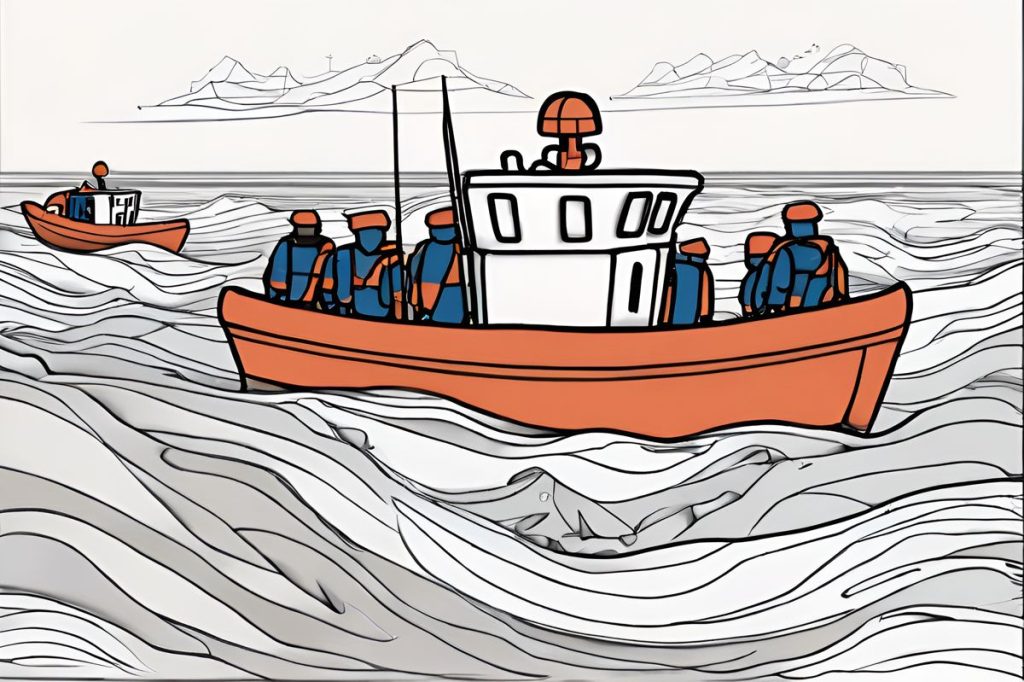Cyprus faces a surge in asylum seekers arriving by sea, with 263 individuals intercepted in just one evening, mainly from Lebanon and war-affected regions. This influx poses significant logistical and humanitarian challenges, requiring a coordinated regional response and international assistance to manage the escalating crisis.
What is the current challenge Cyprus faces with asylum seekers arriving by sea?
Cyprus is experiencing an immigration crisis due to a surge in asylum seekers arriving by sea, mainly from Lebanon and war-affected areas like Syria. In a single evening, two boats with 263 asylum seekers were intercepted. This increase poses significant logistical and humanitarian challenges, demanding a coordinated regional response and international support.
The Unfolding Crisis at Sea
Cyprus is grappling with a significant uptick in sea arrivals, as two boats carrying 263 asylum seekers were intercepted by authorities on a single evening. This latest rescue operation channeled the passengers to the secure confines of Larnaca port, highlighting a trend of increased crossings from Lebanon. The mainly Syrian men seeking asylum have prompted the Interior Minister, Constantinos Ioannou, to label the situation a severe immigration crisis during his interview with a national broadcaster.
The rising numbers are not only a logistical concern but also a humanitarian one. The initial boat, a smaller vessel, was carrying a diverse group of 27 individuals, including women and minors. It was intercepted a distance from Cape Greco, where a minor was taken into custody under the suspicion of navigating the vessel. The second, larger boat with 236 men was spotted further out at sea and its interception is pending.
Maritime Response and Wider Context
Coast guard members and a police helicopter quickly mobilized to pinpoint the exact location of the latest boats. Cyprus’s response illustrates the challenge coastal nations face in monitoring their waters for such arrivals. The frequency of these crossings is notable; within a short span, 13 boats carrying 739 individuals have reached Cyprus, leading to the arrest of several alleged boat navigators.
The first quarter of 2024 has already seen a sharp rise in irregular maritime entries, with numbers reaching into the thousands. This surge in sea crossings reflects the broader geopolitical tensions in the region and underscores the persistent push factors driving individuals from conflict-affected nations like Syria.
Operational Challenges and Immediate Measures
The Cypriot authorities’ response to these arrivals extends beyond the immediate rescue operations. After safety assessments, new arrivals are typically transferred to reception centers, like the one in Kokkinotrimithia. There, they undergo necessary administrative procedures. This process can be complex and is compounded by the sheer volume of arrivals, which impacts the capacity of existing systems and resources.
In light of the escalating situation, it is evident that Cyprus, like many other front-line states, is in urgent need of a coordinated regional response. With asylum seeker boats becoming a regular occurrence, the international community’s role in sharing responsibility and providing support becomes crucial. This situation is continually evolving, and the coming months will likely be critical in shaping the island’s approach to this ongoing crisis.
How many asylum seekers were intercepted in just one evening in Cyprus and where were they mainly from?
In just one evening, Cyprus intercepted two boats carrying a total of 263 asylum seekers. The individuals were mainly from Lebanon and war-affected regions like Syria.
What challenges does the surge in asylum seekers arriving by sea pose for Cyprus?
The surge in asylum seekers arriving by sea poses significant logistical and humanitarian challenges for Cyprus. The increased numbers require a coordinated regional response and international assistance to manage the escalating crisis.
How is Cyprus responding to the increasing number of asylum seekers arriving by sea?
Cyprus has mobilized coast guard members and police assets to monitor and intercept boats carrying asylum seekers. Upon interception, the individuals are taken to reception centers like the one in Kokkinotrimithia for safety assessments and administrative procedures.
Why is the international community’s support crucial in addressing the asylum seeker crisis in Cyprus?
With asylum seeker boats becoming a regular occurrence and the capacity of existing systems and resources being strained, Cyprus needs a coordinated regional response and international assistance to effectively manage the escalating crisis. Sharing responsibility and support from the international community will be crucial in addressing this ongoing challenge.

